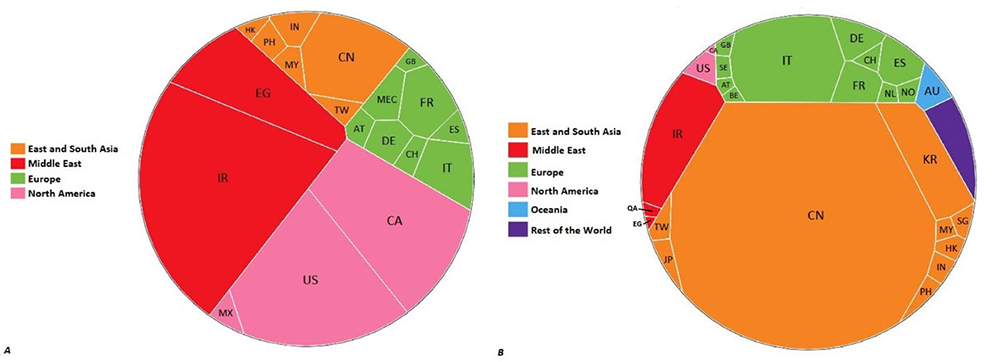
Breadcrumb
- News and Events
- News
- Content
- COVID-19 pandemic: Looking back to better tackle future challenges
null COVID-19 pandemic: Looking back to better tackle future challenges
In two recent studies, RI-MUHC researchers provide useful information for evaluating public health strategies
June 23, 2020
Source: MUHC. Unprecedented challenges—like the current COVID-19 pandemic—sometimes require unprecedented actions, and it is only with hindsight that one can evaluate them. Two studies led by RI-MUHC researchers provide insights for evaluating strategies employed to prevent and manage COVID-19 pandemic in Canada
Hydroxychloroquine shortages: when the enthusiasm for a potential cure affects patients
Given the public and scientific optimism for hydroxychloroquine (HCQ) at the start of the COVID-19 pandemic as a potential treatment for the new disease, several editorials pointed towards concern for shortages of this inexpensive medication that is used very widely for the treatment of several rheumatic diseases. A team of researchers at the Research Institute of the McGill University Health Centre (RI-MUHC) quickly organized a national survey of rheumatologists in Canada to learn about their experience of HCQ shortages, and the results, published in Annals of the Rheumatic Diseases, reveal that a majority of respondents reported difficulties in accessing or renewing the drug.
A total of 531 Canadian rheumatologists were contacted between April 14 and 24, 2020, and 134 (25% response rate) completed the 5-question survey, which included province of practice, whether they had concern about HCQ shortages in their province and whether they had been contacted by patients or pharmacies regarding difficulties renewing HCQ prescriptions during the COVID-19 pandemic. They were also asked by how many patients they had been contacted.
Three quarters of the respondents (n=102, 76%) were concerned about HCQ shortages, while 81 (60%) had been contacted by pharmacies or patients regarding difficulties accessing or renewing HCQ. The problem was much more apparent in Quebec, where 90% of rheumatologists reported HCQ access issues. On average Quebec rheumatologists reported about 10 times more affected patients compared to other provinces (median of 50 patients per physician in Quebec vs. 5 in the rest of Canada).
The authors note that “the substantially different experience of Quebec rheumatologists may furthermore be an unintended consequence of system-level mitigation strategies to proactively manage impending HCQ shortages.” Quebec health authorities restricted HCQ access for all indications except systemic lupus erythematosus (SLE) (as well as pregnant and pediatric patients), in order to protect these vulnerable groups.

“By limiting HCQ access to only these groups, the drug became unavailable for all other patients. With 1% of the Quebec population having rheumatoid arthritis, many of whom are taking HCQ, this restriction affected rheumatic disease patients and their care providers enormously,” says the lead author of the text, Dr. Evelyne Vinet, Scientist in the Infectious Diseases and Immunity in Global Health Program at the RI-MUHC and Associate Professor in the Department of Medicine at McGill University. “The clinical impacts of shortages for these patients remain unknown and deserve close attention.”
***
The study Hydroxychloroquine shortages during the COVID-19 pandemic was conducted by Arielle Mendel MD, MSc, Sasha Bernatsky MD, PhD, Carter Thorne MD, Diane Lacaille MD, MHSc, Sindhu R Johnson MD, PhD and Evelyne Vinet MD, PhD. DOI: http://dx.doi.org/10.1136/annrheumdis-2020-217835
Tracking the travel history of early COVID-19 cases in Canada
Researchers at the Research Institute of the McGill University Health Centre (RI-MUHC), in collaboration with researchers at Université de Montréal, have tracked the travel history of the first patients who tested positive to COVID-19 in Canada, to help regulators evaluate whether or not strategies employed to prevent the spread were, in retrospect, optimal. Published in the International Journal of Infectious Diseases, their article shows that by March 11, 2020, when 64.1% of the world’s COVID-19 cases originated in China, only 7.6% of Canada’s COVID-19 cases had previously travelled to China. The most commonly reported travel history among the 118 confirmed cases at this date originated from the Middle East, the United States and Europe.
The researchers followed the earliest 118 confirmed COVID-19 cases in Canada released by government websites every day and obtained the travel history of these cases from national and local news websites. They cross-validated all cases with those summarized by online websites and media, to ensure the correctness of the count of the confirmed cases and their origins.
Of the 118 cases, nine (7.6%) were related to travels from China, while 35 (30.0%) were linked to travel from Iran. “Other travel destinations that were highly implicated included the United States (18.2%, by air or surface travel), Europe (13.1%), and Egypt (10.1%),” note the authors in their article.

“Our results clearly indicate that our citizens travelling outside Canada (including to the US, the most popular destination) represent a key way pathogens are transmitted into Canada,” says the lead author of the study, Dr. Sasha Bernatsky, Senior Scientist in the Infectious Diseases and Immunity in Global Health Program at the RI-MUHC.
This research was the idea of Dr. Naizhuo Zhao, a research associate at the Centre for Outcomes Research and Evaluation at the RI-MUHC. He used a visual representation called a Voronoi treemap to show countries and regions from which the first 118 identified Canadian COVID-19 patients had returned. The community cases, i.e., without recent travel records, were accounted as Canadian (Figure 1A). Another graph was produced to show the distribution of confirmed COVID-19 cases in the world by March 11, 2020 (Figure 1B).
“Our study suggests that in the era of globalization, the risk of importing an epidemic from a given country is not necessarily proportional to the number of confirmed cases of disease in any one country,” says Dr. Bernatsky, who is also a James McGill professor at McGill University. “Travel bans related to more countries could have been considered to block the spread of COVID-19, as well as screening of travellers coming from abroad.”
Potential limitations to the study include the possible under-reporting of COVID-19 cases in certain countries and the under-detection of mildly symptomatic or asymptomatic cases, but the study still provides a revealing picture of the situation that prevailed when the pandemic hit Canada.

***
The study Tracking the origin of early COVID-19 cases in Canada was conducted by Naizhuo Zhao, Ying Liu, Audrey Smaragiassi and Sasha Bernatsky. DOI: https://doi.org/10.1016/j.ijid.2020.05.046
This work was funded by the Canadian Institutes of Health Research (CIHR) (PJT-159682).